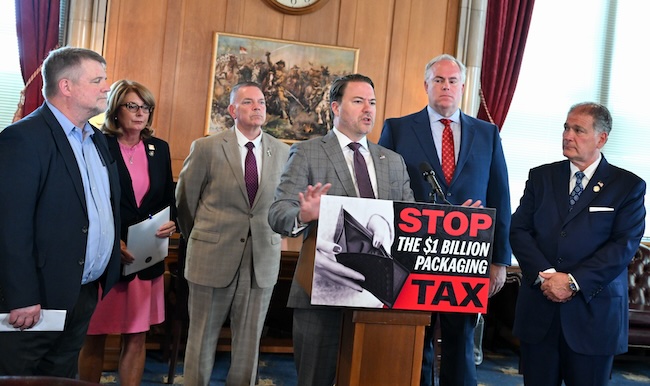Ortt, Senate Republicans warn about crushing new mandate on businesses
‘Packaging Reduction and Recycling Infrastructure Act’ seen as costly red tape

Photo courtesy of Rob Ortt’s Office: State. Sen. Rob Ortt and some of his Republican colleagues speak in Albany today against the Packaging Reduction and Recycling Infrastructure Act.
Press Release, State Senate Republican Leader Rob Ortt
ALBANY – State Senate Republican Leader Rob Ortt and members of the Senate Republican Conference stood in opposition to the Packaging Reduction and Recycling Infrastructure Act (S.1464), a crushing mandate on businesses that will lead to higher costs for consumers.
This bill would impose costly new mandates and additional burdensome red tape for New York businesses by forcing businesses to register with a packaging reduction organization and setting unrealistic timelines for the elimination of certain materials for packaging purposes.
This legislation will further drive up the cost of doing business in the State, and will lead to more job losses and businesses leaving the state. It will lead to even higher consumer costs at a time when New York’s economy is already struggling and outmigration is at an all-time high.
“In reality this bill will have very little impact on saving the earth, but a very big, very devastating real life impact on hardworking New Yorkers and businesses,” said Senate Republican Leader Rob Ortt. “This is nothing more than a crushing mandate that will make it more expensive to do business in New York and lead to higher costs on consumer goods at a time when so many New Yorkers are struggling.”
According to a Consumer Cost Study from May of 2024 conducted by the Business Council of New York State, consumers could be faced with a $1 billion dollar a year cost increase over a five year period. This could lead to increased household costs of $720 per household, at a time when New Yorkers are already struggling to make ends meet amidst skyrocketing costs and rates of inflation.
“The Harckham/Glick packaging EPR bill is the wrong approach for New York,” said Ken Pokalsky, Vice President, The Business Council of New York State. “It will result in increased consumer costs and reduced consumer choice, and will be costly if not impossible for businesses to comply with. In key respects, it differs significantly from what other states have recently adopted, including Minnesota and Maryland. New York should adopt workable solutions, that focus on improving its recycling programs, not banning materials and products.”

























































